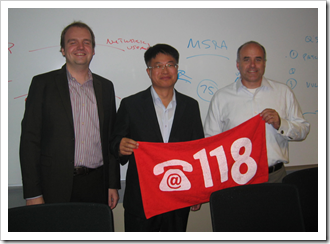Internet troubles in Korea? E-call center 118 is there to help.

Handle:
Cluster
IRL:
Maarten Van Horenbeeck
Rank:
Senior Program Manager
Likes:
Slicing covert channels, foraging in remote memory pools, and setting off page faults
Dislikes:
The crackling sound of crypto breaking, warm vodka martni
Microsoft often has the pleasure of welcoming foreign government officials to our headquarters. MSRC’s engagement with them usually starts with us trying to better understand the specific Internet security situation in a particular country, and to see how we can better cooperate together. In the past, we have implemented training programs, announced programs such as the Defensive Information Sharing Program (DISP) and supported technical initiatives to help address their very specific risks, and protect their citizens online.
Malware, botnets and cyber criminals often behave very differently in specific countries, and have different goals or intentions. In Asia, for instance, trojans often target passwords to online games or services, whereas in Brazil, banking trojans are a larger issue of concern. It’s helpful for us to learn about country-specific threats, so we can relay concerns back to our product teams that have the ability to battle them.
In center, Mr. Kwangjin Park, Executive Vice President, Korea Internet & Security Agency (KISA)
From left to right:
Maarten Van Horenbeeck, Senior Program Manager, MSRC
Mark McIntyre, Director, Government Security
Earlier this month, our team was honored by a visit of a delegation of KISA, the Korea Internet & Security Agency. KISA is a government agency that concentrates its work in three areas: Internet Promotion, Internet Security and Promote International Cooperation in the area of ICT and broadcasting. Their overarching goal is to make the Internet accessible, secure and useful to the people of Korea as well as to promote broadcasting and communications technology and services.
Korea is a special country when it comes to Internet use. It has a highly sophisticated, Internet-aware population with very high usage rates. In addition, much of their Internet use is mobile, with smart phones offering access to a large set of the population.
During our discussions, Mr. Park and his team presented to us the specific issues they are concerned about, and introduced some of their techniques to protect Korean internet users. Given Korea’s widespread use of the Internet for both public and private services, they have a thorough understanding of the need for clean and safe access to the Internet.
In Korea, their team manages the e-call center 118. This service is a hotline that provides toll-free, 24-hour Internet-related response services. Essentially, their trained team helps any Korean with issues such as a compromised machine, computer viruses and malware, spam, infringement of a user’s privacy, or any questions related to the use of the Internet. Wherever and whenever in Korea, a user can simply press 118 on his phone, and will be connected to a specialist to discuss the security issues he or she is experiencing. In addition, KISA operates a service that allows users to automatically forward spam to their team, which then investigates. Some years ago, Korea implemented stringent laws against spam, which they have the ability to enforce.
Microsoft has long recognized a need for expert assistance with security issues. Many years ago, we made a decision as well to support our customers for free regarding any malware issues, or problems during the deployment of security updates. In the US and Canada, this service is available by phone at 1-866-PCSAFETY. It is great to see this need acknowledged and to see KISA do this for Koreans at a national level.
From our end, we were happy to be able to provide KISA’s delegation with a briefing on how we are seeing many security issues in Asia, and Korea in particular, evolve. In particular, a lot of time was spent discussing how to combat malicious code and Distributed Denial of Service (DDoS) attacks, which is a common concern to Korea. In addition, we discussed Microsoft’s ability to share guidance and technical information to work together with KISA to further promote safe and secure internet access to Koreans.
?????,
Maarten
*Postings are provided "AS IS," with no warranties, and conferring no rights.*
